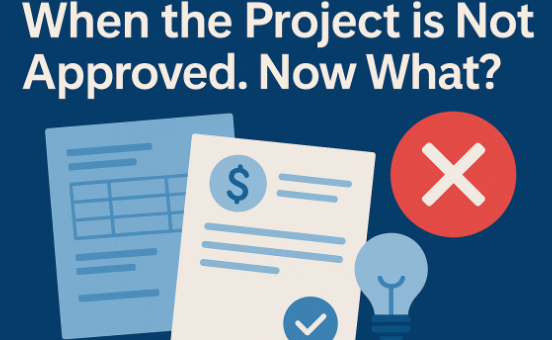Leonardo Cunha
Leadership | Entrepreneurship | Management | Planning | Strategy | Writing for Finance | Development finance expert | International speaker
1st September 2025
Rejection is an inevitable part of the nonprofit landscape. Every year, organisations submit carefully designed proposals that, despite all efforts, do not make the final cut. While the initial response may be disappointment, it is vital to reframe this moment: rejection is not failure-it is an invitation to learn, improve, and grow.
Non-Profit Organisations (NPOs) operate in an increasingly competitive funding environment, where demand far outweighs supply. Studies highlight that less than 20% of funding applications receive approval in many competitive programmes (Buteau & Buchanan, 2019). This reality underscores the importance of treating rejection not as an end point, but as a natural part of the funding cycle.
From an organisational learning perspective, rejection holds transformative potential. Argyris and Schön's (1996) theory of organisational learning emphasises that reflection on setbacks is essential for generating adaptive strategies and sustainable practices. When proposals are not approved, NPOs have a unique opportunity to revisit their Theory of Change, refine objectives, and strengthen the alignment between project design and funder priorities.
Moreover, rejection encourages nonprofits to cultivate resilience and adaptability. As Searle and Ball (2019) argue, resilience in the nonprofit sector is built not through uninterrupted success but through cycles of adaptation and renewal in the face of challenges. This reframing process allows organisations to identify weaknesses-whether in budget planning, stakeholder involvement, or monitoring and evaluation frameworks-and convert them into strengths for future submissions.
Crucially, the learning that emerges from rejection is not limited to technical improvements in project writing. It also involves enhancing communication with stakeholders, engaging more deeply with communities, and fostering stronger partnerships. As Kolb's experiential learning theory suggests, authentic learning occurs through a cycle of experience, reflection, conceptualisation, and experimentation (Kolb, 2015). A rejected proposal, then, becomes the raw material for the next, better-informed attempt.
In practice, organisations should systematise this learning process. Collecting feedback from evaluators, organising internal debrief sessions, and mapping the gaps between proposal objectives and funder expectations are practical steps towards continuous improvement. Beyond securing the next grant, such practices strengthen the overall institutional capacity of NPOs, ensuring they remain mission-driven and adaptive in a rapidly changing environment.
Rejection is not a verdict on an organisation's worth but a critical step in its journey. The true measure of an NPO is not how many proposals are approved on the first attempt, but how it transforms setbacks into knowledge, resilience, and eventually, impactful projects.
References
Argyris, C., & Schön, D. A. (1996). Organisational learning II: Theory, method, and practice. Reading, MA: Addison-Wesley.
Buteau, E., & Buchanan, P. (2019). Foundations respond to grantee feedback. Centre for Effective Philanthropy. Retrieved from https://cep.org
Kolb, D. A. (2015). Experiential learning: Experience as the source of learning and development (2nd ed.). Upper Saddle River, NJ: Pearson Education.
Searle, R., & Ball, N. (2019). Organisational resilience in the voluntary sector: The role of learning and adaptation. Voluntary Sector Review, 10(2), 153-172. https://doi.org/10.1332/204080519X15549755380044


